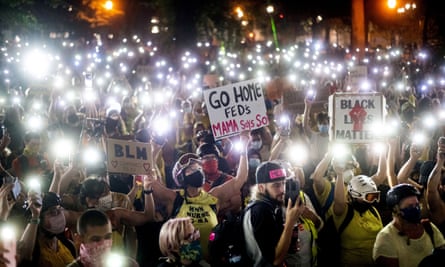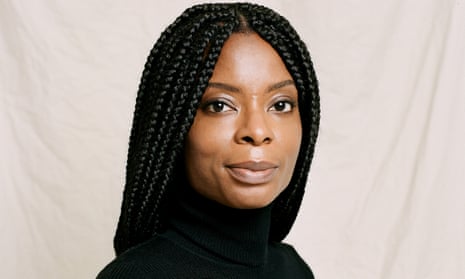Otegha Uwagba wants to get some things off her chest. From her home in south London, where she grew up, she tells me that her new short book Whites is a culmination of not just the past few months or even year, but a work that is the fruit of a decade of thoughts, experiences and epiphanies.
“I have been making notes for the past four or five years,” Uwagba tells me. When she was working at a place that felt hostile, she “started making observations about feelings and incidents and anecdotes that happened to me that were racist or had troubling dynamics”. With the death of George Floyd and the deluge of white “allyship” that followed, Uwagba felt that white people’s solidarity was insufficient, performative, even narcissistic. For black people to experience racial discrimination and yet be surrounded by white people ostensibly on their side, but continuing to add injury by being passively complicit, was to suffer twice.
Behind Uwagba’s restrained prose you can sense an iceberg of rage and frustration. Her purpose is to sum up the mental tithes of co-existing with whiteness. “I just wanted to communicate the burden of whiteness, the mental and emotional trauma,” she says. This burden is placed on black people by “the progressive, liberal people that I interact with, on a daily basis work with,” people they “are friends with, perhaps have intimate relationships with”. The people who, despite their immaculate politics, present a barrier to racial equality because they do not understand that racial justice is “redistributive” – that they must give something up if black people are to thrive.
Whites will be called an “uncomfortable” read, a “searing” text from a writer who “takes no prisoners”. But it is intended as a break from the “black reading list” – a genre that, Uwagba argues early in her essay, brings white people a sort of academic understanding of race, but rarely stirs any action.
The essay was almost never written. The tension between wanting to write about race, her observations and her experiences, and the concern that her work will be co-opted to assuage the guilt of the very people she was placing on the hook, was paralysing. “It was a big decision for me and there was some back and forth around it for me internally. I definitely considered not writing it.” Her discomfort with the possibility that it would be shoehorned into the “reading list for white people” genre was something she had to get over. The way out of the dilemma was simply to make sure she “wrote the truth”.

Despite the title, the book is not really for white people. What Uwagba hopes to achieve through the chronology of emotion, anger and disappointment in white allies since the death of Floyd, is a sort of shared black commiseration, a communing via the upheavals since the summer of Black Lives Matter. “I know it’s got their name on it,” she says, “and in that sense it’s addressed to them, but what I thought about a lot was how to write a work about race and racism and whiteness that isn’t just for the consumption of white people. It’s really, really important to me that this was an essay that black people can read and take something from, because with a lot of these anti-racist books and handbooks that are being published – I don’t get anything from them.”
“Some people will buy it expecting a white allyship handbook,” she acknowledges, “but that’s not what it is and it’s certainly not what I intend it to be. I want them to feel uncomfortable. I want them to feel challenged. I want them to feel confronted.”
The concept of white allyship, its promise and overnight ubiquity, was something Uwagba began to mull over in the summer of this year, and she kept coming up against its limitations. “I feel that white people have a discomfort around racial injustice, and more so now than ever. Donald Trump opened their eyes to it. But there’s a thing called the principle implementation gap … they think racism is bad and they want it to be over. But the implementation and the facts of that require them to do things they are not willing to do. That for me is where the problem lies. I think it’s realistic to expect people to give up power out of a sense of moral duty, but how pressing is that sense of moral duty? Where in the moral spectrum does racism lie for white people?
“White people talk a big game about allyship and dismantling racism but when it came to the prospect of maybe losing their jobs or getting in trouble at work in order to take a stance against racism, they weren’t willing to do it. That for me pushed up against the boundaries, the extent to which they think racism is a bad thing.” Social media has become a force that merely gives white people undemanding ways of showing solidarity.
“That stuff is easy to do,” she says. “There is a reason why the concept of allyship that has now become popularised is not the one that I talk about: it’s incredibly demanding and hard. How hard is it to give up your Instagram page? Makes you look good. Probably makes you feel good as well. Genuine allyship is probably not going to feel good for white people. It means giving up power, money, wealth, opportunities, things that will change the quality of your life and make it feel relatively worse. No one is talking about those very unsexy actions. It requires loss.
“I’m 30 years old now, I’ve spent my entire life treading around white people’s feelings. My job is to write the truth. After George Floyd was killed, I had some very uncomfortable conversations with some of my close white friends.” When her mother asked her how it was going with those friends Uwagba said: “I’ll be honest, not everyone’s going to make the cut.”
These words may look sharp on the page, but she says them without any edge to her voice, with the calm of someone who has found peace in the realisation that racism may be a problem for her, but it is not her problem. “This is my identity, this is my life, I cannot sustain relationships or friendships with people who don’t fully get that. You either get it, or try to get it. Or you’re gone.”
Her zero tolerance approach is informed by the fact that racism is so obvious that people who choose to argue its existence are being “wilful” in their ignorance. She refuses to “bleed on the page” to give white people more proof than they need that they have to do something. They have all the proof they need. Will it ever be enough?
“I’m quite a cynical person,” Uwagba remarks, when pondering the future and the prospect of change. “Can we expect dominant identities to concede power purely out of the goodness of their hearts? Well, they say they want to.” She pauses, then gives an almost imperceptible shrug. “We will see.”
